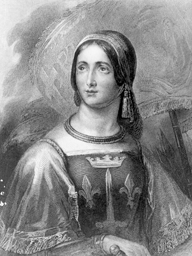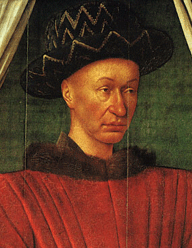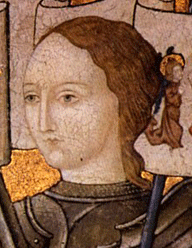|
Joan of Arc
Answer
to Name
This Famous Person Game - June 2012
by Mike McLeod
 First, this is not an actual portrait of Joan of Arc because the only known portrait of her was destroyed. All the paintings you have seen of her are symbolic. Even so, many readers recognized her: Adele Fricano of Braselton, Ga.; Tim Kilkelly; co-owner of Treasure Alley in Arcadia, Fla.; Jim Pruett of Eastbrook Flea Market in Montgomery, Ala.; Thom Murphy of Church Street Antique Market in Covington, Ga.; Jeanne Waters of Smyrna, Ga.; Jan Bondy-Chorney of Ancaster, Ontario, Canada; Robert Bernier of Beaverton, Ontario, Canada; Charles O’Brien of Mesa, Az.; Jim Holmes of Wellington, Fla.; Teresa P. Bland, Collector, NYC; Ann Michele Worrall of Peachtree Corners, Ga.; David Parham of Stone Mountain, Ga.; and Brenda Locklear of Chattanooga, Tenn. First, this is not an actual portrait of Joan of Arc because the only known portrait of her was destroyed. All the paintings you have seen of her are symbolic. Even so, many readers recognized her: Adele Fricano of Braselton, Ga.; Tim Kilkelly; co-owner of Treasure Alley in Arcadia, Fla.; Jim Pruett of Eastbrook Flea Market in Montgomery, Ala.; Thom Murphy of Church Street Antique Market in Covington, Ga.; Jeanne Waters of Smyrna, Ga.; Jan Bondy-Chorney of Ancaster, Ontario, Canada; Robert Bernier of Beaverton, Ontario, Canada; Charles O’Brien of Mesa, Az.; Jim Holmes of Wellington, Fla.; Teresa P. Bland, Collector, NYC; Ann Michele Worrall of Peachtree Corners, Ga.; David Parham of Stone Mountain, Ga.; and Brenda Locklear of Chattanooga, Tenn.
Second, "Joan of Arc" is not exactly her name. After her capture and during her trial, Joan said, "In my own country they call me Jeannette; since I came into France I have been called Jeanne. Of my surname I know nothing."1
Surnames at that time were not always used and could be changed by an event. Jeanne often referred to herself as la pucelle (“the maid,” signifying her virginity and devotion to God); her birth village of Domremy in northeast France was later renamed Domremy-la-Pucelle after her. Her father’s name was Jacques d’Arc so perhaps later historians added that surname. Her mother was Isabelle de Vouthon, but later her last name was listed as Romée, which was a title given to those who made a pilgrimage to Rome.
Jeanne was born in 1412, probably on Jan. 6,2 about 75 years into the Hundred Years’ War (1337-1453) between France and England, which was actually a series of wars and battles taking place over 116 years. There were periods of peace during that time, and also the Black Plague struck in 1348.
Like her mother, Jeanne was a pious person. She had two brothers and a sister, and the two brothers joined the army she led for Charles VII after she left home on her mission from God.
Also during her trial, Jeanne said at the age of 13 she heard a voice and saw a bright white light during the day that told her to attend to her religious duty. She also said God spoke with her, and she heard voices and saw angels regularly. She identified the angels as being Michael, Gabriel, Saint Catherine and Saint Margaret (the latter two being women who were martyred). The voice said to her, "…two or three times a week: 'You must go into France.'"3
At this time, the English had control of much of France. They also had an alliance with the Burgundians, who were French people of German descent from the north where Jeanne lived. In this war to conquer France, the English used tactics like the scorched earth policy to destroy villages and the will to fight, and they were victorious in battle with the French for decades. They controlled Paris, and the last major holdout against them was the City of Orleans.
 At the age of about 17, Jeanne left home without her parents’ knowledge, and she eventually convinced a nobleman in the military to secure her entrance to see Charles VII. She did this by miraculously reporting the outcome of a battle near Orleans before its outcome was known. At the age of about 17, Jeanne left home without her parents’ knowledge, and she eventually convinced a nobleman in the military to secure her entrance to see Charles VII. She did this by miraculously reporting the outcome of a battle near Orleans before its outcome was known.
At this time, Charles VII was the Dauphin of France, the uncrowned heir apparent since the previous king died without an heir. He had all but given up in the war with England, but after long and ardent pleading by Jeanne of her mission from God and His will that Charles be king, he decided to give this peasant girl one last chance in a hopeless war. He sent his army with her to Orleans, and to his surprise, they defeated the English in three days and broke the siege.
Jeanne, by many accounts, was a brilliant strategist and inspiring leader. She did not kill anyone in battle, but she did drive the loose women from the army’s camp at sword point at times. She also chastised the battle-hardened knights for not attending Mass. Obedience to God’s commandments was extremely important to her because she knew that was required for God’s blessings. Under her leadership, the army went on to further victories, and she attended Charles VII as he was crowned as King of France.
That did not end the war, and during a battle, Jeanne was betrayed and then captured by the Burgundians who sold her to the English for 10,000 francs. Desiring to get rid of her without being held responsible for her death, the English put her in chains in prison and gave her to French clergy loyal to them to be tried for heresy.
Jeanne was imprisoned for about a year, and her trial lasted about three months, consisting of six public examinations and nine private examinations. The questioning was led by Bishop Pierre Cauchon, and in each of the public examinations, he was attended by from 38 to 62 assessors from the clergy. Cauchon was French, but he was against Charles VII. He led the negotiations with the Burgundians in selling Jeanne to the English, and he was paid well for doing so.
Can you imagine how a peasant girl must have felt facing this army of clergy, virtually all biased against her? Yet, from the records kept of these cross examinations, Jeanne is shown by her own words to be intelligent, wise, well-spoken and upright.
Examiner: “Do you know if you are in the grace of God?”
Jeanne: “If I am not, may God place me there; if I am, may God so keep me. I should be the saddest in all the world if I knew that I were not in the grace of God. But if I were in a state of sin, do you think the Voice would come to me? I would that every one could hear the Voice as I hear it. I think I was about thirteen when it came to me for the first time.”4
Seventy charges were brought against Jeanne, but these were later reduced to 12. The worst of which were heresy, witchcraft, invoking demons and wearing men’s clothing. Deuteronomy 22:5 says: “The woman shall not wear that which pertaineth unto a man, neither shall a man put on a woman’s garment; for all who do so are abomination unto the LORD thy God.” These experts of theology either did not realize or did not care to realize that this was part of the Law of Moses which was fulfilled by Jesus Christ and replaced by His Gospel.
Jeanne was found guilty and turned over to the English for sentencing, which was burning at the stake for heresy. On May 24, 1431, Jeanne was taken to a platform in a church cemetery before a large crowd. When she was admonished to disavow her testimony and her deeds, she requested her case be sent to the pope. That was denied. Then as her sentence was being read, which included excommunication, Jeanne recanted her testimony of her revelations. Her sentence was then changed to life in prison on bread and water, but she was not excommunicated.
The clergy visited her in prison later that day, and she agreed to wear women’s clothing from then on. Part of the reason why she was in male attire was to protect herself from abuse by the English guards and nobles. Four days later, the clergy returned to find Jeanne in men’s clothing again. She said her other clothes were taken so she had to return to men’s clothing. In addition, she said she was not allowed promised privileges: to go to Mass and to have her iron shackles removed. She further stated that she did not understand what she was recanting and that she did not intend to revoke anything. She confessed that she recanted when she saw the flames.
 Death by fire is a terrible and extremely painful way to die. What would you have said at the age of 19 if you faced death by fire? Death by fire is a terrible and extremely painful way to die. What would you have said at the age of 19 if you faced death by fire?
On May 29th, she was declared relapsed and excommunicated. On May 30, 1431, she was returned to the platform outside the church, declared heretic in front of the people, turned over to the English, and burned at the stake. The documents recording these proceedings were signed and sealed in wax attesting to it all.
Certain of the clergy who questioned her in prison later reported that she again recanted her testimony in prison before her execution. Those documents were not signed or sealed.
The sentence against Jeanne was nullified by the Catholic Church in 1455, and it was found that the records had errors and had been altered, but it did not specify in what ways. In 1920, she was declared a saint, which means two miracles were attributed to her after her death.
Jeanne d’Arc is the national heroine of France. Through her leadership and efforts, France eventually became a unified nation. There is no doubt that she was one of the great people of history and an example for all of us. Jeanne was a faithful servant who completed her mission.
“There is not a day when I do not hear this Voice; and I have much need of it. But never have I asked of it any recompense but the salvation of my soul.”5
------------------------------
1
First Public Examination.
2 Catholic Encyclopedia.
3 Second Public Examination.
4 Third Public Examination.
5 Second Public Examination.
Learn
about more Famous People
|